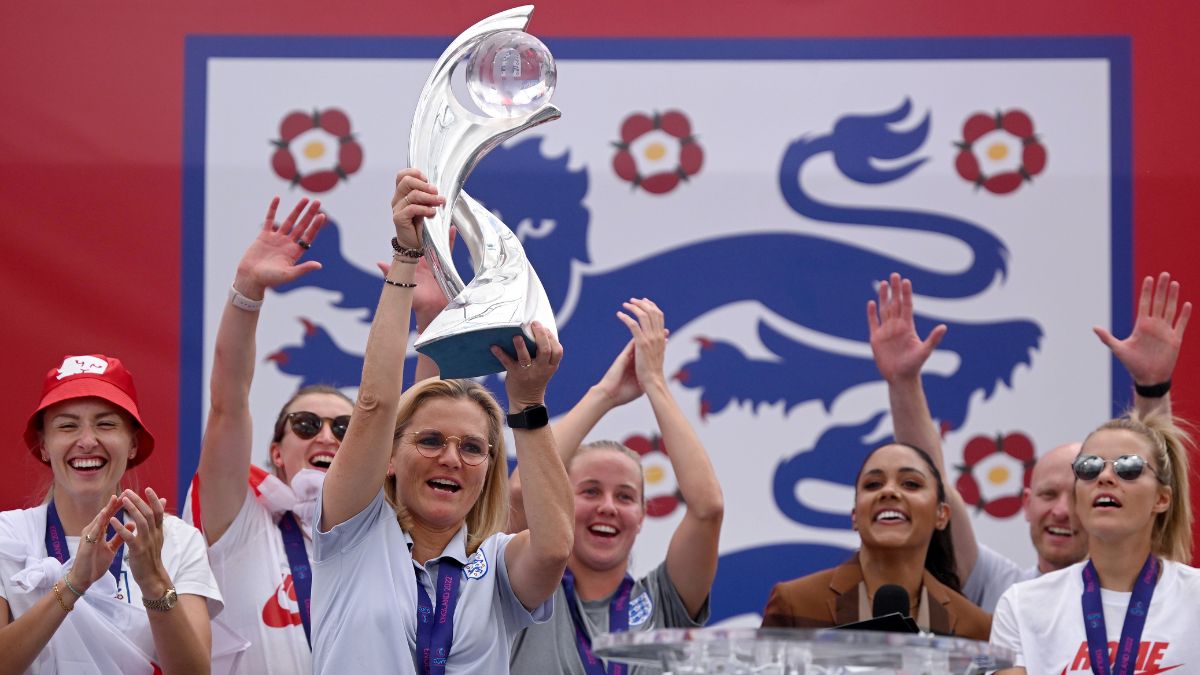
Business leaders looking to develop a winning culture need look no further than the England women’s national football team who stormed to victory at the Euros last week.
In doing so, they became the first English women’s team to take home a major international trophy after beating Germany 2-1 in the final.
In her pre-match press conference, team captain Leah Williamson said: “This hasn’t just been a change for women’s football but society in general… tomorrow is not the end of a journey but the start of one.”
Following their victory, the Lionesses wrote an open letter to the two prime ministerial candidates Liz Truss and Rishi Sunak pressing for greater access to football education for schoolgirls.
This notion of creating a legacy can be a powerful one for leaders to employ, according to Karen Thomas-Bland, founder and director of consultancy Seven Transformation.
“A culture of success is built by celebrating wins to keep motivation and commitment levels high. The ultimate strategy though is always on the end game,” she says. “This is not just about winning the match or even the competition. It’s about creating a legacy and that’s a much more powerful vision for people to buy into.”
How to nurture a winning culture
Thomas-Bland believes that – like the Lionesses – a good company team starts with a strong set of values and an inclusive culture, where everyone feels part of the group’s success.
“It’s important to build a culture of psychological safety where everyone can speak honestly and openly,” she adds. “No one brings their A game when they are afraid to speak up or bring their whole self to work.”
Trust is therefore a vital ingredient. According to research from The Workforce Institute at UKG, 60% of UK employees said that trust directly impacts their sense of belonging at work and roughly the same amount (61%) said that a lack of trust damages their productivity.
Nicole Bello, group vice president EMEA at UKG, says: “When an organisation’s default position is to presume trust and good intentions, it can reimagine outdated processes and focus on driving performance… Great businesses are powered by great people and empowering great people to do what they do best will have a direct impact on success.”
To achieve this, managers must form meaningful connections with their employees and be transparent to form what Bello describes as a “bi-directional culture of trust”.
Many of these leadership qualities were exhibited by the England women’s national team manager Sarina Wiegman. The former Dutch international has now led two teams to European success, after first coaching her home nation to victory in 2017.
Executive coach Marie O’Riordan claims that, by focusing on her team’s own strengths, rather than those of the opposition, Wiegman was able to build collective self-belief in her team.
She adds: “Individual players felt understood by her, each of them knew what they had to do tactically and were empowered to take risks where there was opportunity. Any leader would do well to study Wiegman’s moves.”
The leadership qualities of Sarina Wiegman
Liz Sebag-Montefiore, executive coach and founder of employee engagement consultancy 10Eighty, agrees that Wiegman’s team-building skills were critical to the England team’s success.
“Wiegman has plainly inspired this team; they were good before but now they are as good a team as you could wish,” she says. “This sort of leadership comes from really knowing her team – what makes each of them tick and how to meld those talents into a cohesive unit.”
Sebag-Montefiore believes that business leaders should attempt to replicate her “people-centred approach to team management” and “laser-sharp focus on being the best”.
This is reflected in the language the England manager uses in interviews. Sarina emphasises the importance of respect within a team and describes her main motivator as “development and getting connected with people to work together on one goal”.
“Sarina recognises the need for a great leader to leave their ego at the door and put the team’s needs first,” says Thomas-Bland. “She doesn’t just build a team but really knits the entire team together, not just those who are out on the pitch but also the entire group that supports them.”
There were points during the tournament where Wiegman exhibited the ruthlessness that can be needed when a tough decision needs to be made – for example, when continuing to use Alessia Russo from the bench, despite pleas from the fans for the Manchester United forward to start matches.
Thomas-Bland adds: “She knows the importance of getting the right mix of people in a team – experienced hands who have done it countless times before, combined with talented but less experienced members who bring tons of energy and passion.”
In this example, Russo understood that starting on the bench was in the interest of the team and that, despite not starting, she could still contribute to its success. If business leaders can foster this same mentality in their teams, they will find that success will surely follow.

Business leaders looking to develop a winning culture need look no further than the England women’s national football team who stormed to victory at the Euros last week.
In doing so, they became the first English women’s team to take home a major international trophy after beating Germany 2-1 in the final.
In her pre-match press conference, team captain Leah Williamson said: “This hasn’t just been a change for women’s football but society in general… tomorrow is not the end of a journey but the start of one.”
